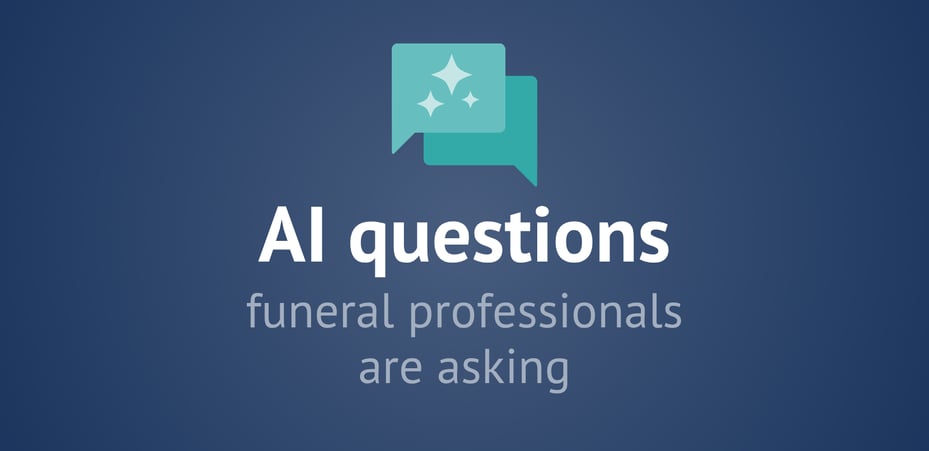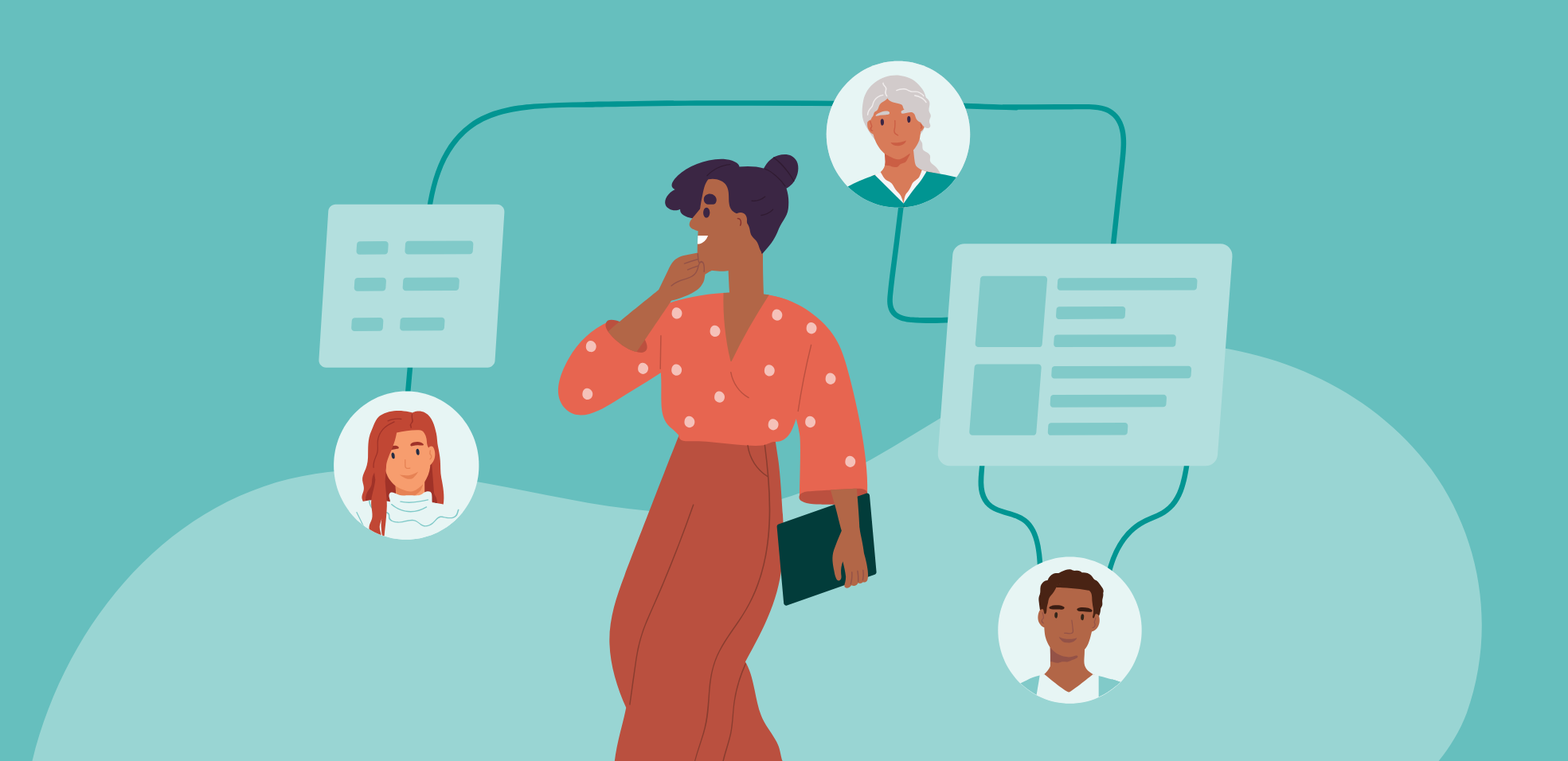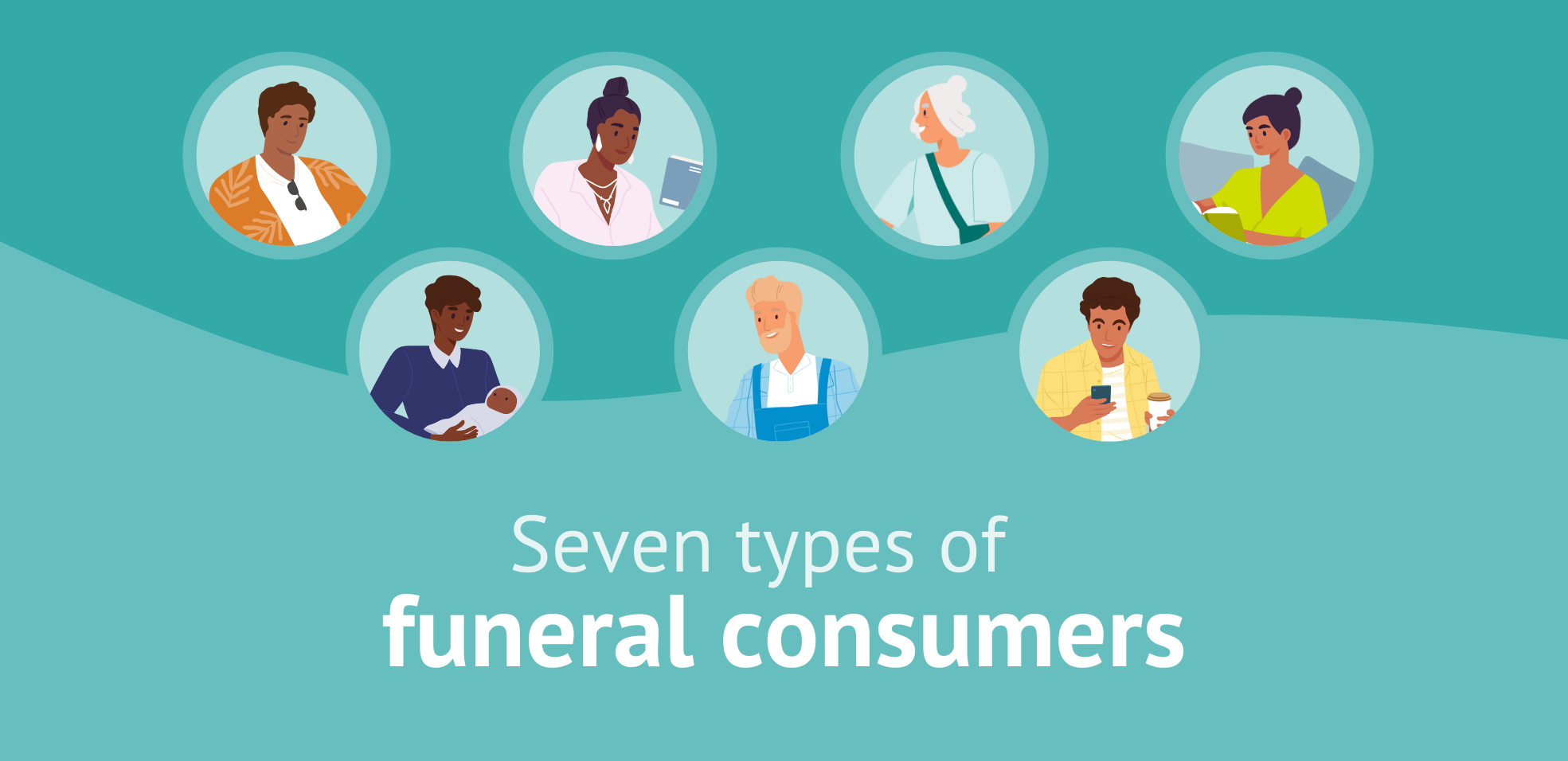AI questions funeral professionals are asking
October 30, 2025

Artificial intelligence is everywhere right now.
It’s in your phone, your smart thermostat, even your grocery list. And now it is making its way into funeral homes.
Feeling a little unsure about AI being a normal part of your business is normal. We get it. Funeral service is built on trust, tradition, and personal connection.
So, the idea of bringing in a tool like AI can feel…risky.
But here’s the thing: families are using AI to plan funerals. They’re using AI tools like ChatGPT to write obituaries, plan memorials, search for service ideas, and more. And that means it’s worth understanding what AI can, and can’t, do.
That’s why we talked to funeral professionals to answer some of the most common questions about AI.
If you’ve ever wondered if AI is safe, useful, or even worth the effort for your funeral home, keep reading. 👇
Is AI threatening the funeral profession?
Hands down, the #1 most common fear we hear among funeral professionals is: “Will AI replace parts of my job or hurt my business?”
It’s a fair concern.
But here’s the twist: AI isn’t just something funeral homes might use, it’s something families are already using.
If a family can write an obituary, plan a service, and create a memorial website with AI tools on their own, they might start to question if they need a funeral director at all.
That’s why it’s more important than ever to show the value of your role. Families expect unique, personalized options. If your services feel too “cookie-cutter,” they might turn to AI for inspiration and skip the human connection altogether.
Here’s the truth: AI should enhance, not replace, the funeral director. It’s a tool to help you work smarter, not a threat to your expertise.
Can I trust AI to help with my daily tasks?
Short answer? Yes, especially when it comes to low-stakes, behind-the-scenes tasks.
A recent study found that workers using AI completed certain tasks faster and produced results that were 40% higher in quality. That’s not just a productivity boost, it’s a game-changer for busy funeral professionals.
Think of AI as your behind-the-scenes assistant. It’s not here to take over. It’s here to help with the stuff that eats up your time but doesn’t require your personal touch.
Once you identify those time-consuming tasks, you can set clear boundaries and use AI where it makes sense.
Here are a few examples of tasks AI can help with:
-
Starting an obituary – Get a first draft going so you’re not staring at a blank page.
-
Preparing talking points – Be ready with unique ideas when you meet with a family.
-
Document scanning – Upload handwritten forms right into your case management software.
-
Online guest books – Automate setup and formatting.
-
Creating tribute videos – Use AI tools to compile photos and music to make a memorable video.
-
Memorial websites – Generate content and layouts faster.
These kinds of tasks don’t require a deep emotional connection, but they still need to get done. Let AI handle the mundane so you can focus on what matters most: supporting families.
Is it risky to use AI to write obituaries?
Not if you are proofreading and editing the draft.
AI is great at helping you get past the blank page, organize your thoughts, and create an obituary that isn’t templated.
But it’s not perfect. Without your eyes, AI-written obituaries can sometimes exaggerate, mix up details, or miss the tone the family hoped for.
Here are some helpful tips:
-
Start with AI – Get a first draft faster so you have more time to personalize.
-
Watch for tone – AI can sometimes be too formal or casual.
-
Double-check facts – Look closely at names, dates, hobbies, and relationships.
-
Add the human touch – Include stories, mottos, personality traits, or meaningful memories. Find more ideas here.💡
>>>>> Need help editing AI-generated obituaries? Check out our blog.
Used thoughtfully, AI can save time and spark ideas. But when honoring someone’s life, your judgment and empathy are essential.
Is AI safe to use with sensitive family information?
Yes, when done the right way.
This is one of the most important questions to think about, and the answer depends on how you use AI.
Free, public AI tools (like ChatGPT or Google Gemini) aren’t designed to handle sensitive data. Anything you type into them could become public.
That’s why avoiding sharing personal family details, names, or case-specific information on those platforms is smart.
Here are a few best practices to protect sensitive information:
-
Use paid versions of AI tools that offer stronger data protection.
-
Stick to tools built into your safe and secure case management software.
-
Avoid entering sensitive information into public AI platforms.
>>>>> Want to learn more? Check out this resource.
The bottom line is that AI can be safe, but only if you’re intentional about how and where you use it.
Can AI understand the emotional side of what families are going through?
Not really, and that’s probably a good thing.
AI can do a lot. It can generate ideas, organize information, and even mimic empathy in writing. But it can’t truly understand grief, loss, or the emotional weight of a funeral. That’s where you come in.
Families need connection. They need someone who can listen, guide, and support them through one of the hardest moments of their lives. AI can’t do that. But it can help you get there faster and be more present with families.
Is AI hard to use or learn?
Not at all.
Most AI tools today are designed to be user-friendly and intuitive. No tech background required. If you can use a search engine or type a message, you can use AI.
Think of it like texting a smart friend with all the answers. You ask a question or give a prompt, and it responds with ideas, suggestions, or even full drafts. The more specific you are, the better the results.
And you don’t have to dive in headfirst. Start small!
How do I get started with AI?
By taking baby steps. You don’t need to overhaul your entire workflow or become a tech expert overnight.
Next time you have a question and your instinct is to Google it, try asking ChatGPT or another AI chatbot instead. You’ll get a direct answer, and often, a few extra ideas you hadn’t considered.
Here are a few easy ways to dip your toes in:
-
Create a meal plan for the week
-
Ask for a grocery list based on your favorite recipes
-
Get help organizing your day or writing an email
Once you’re comfortable, start using AI in your work:
-
Draft an obituary
-
Brainstorm service ideas
-
Create a checklist for a family meeting
-
Prep talking points for a service
And if you’re using Passare, you already have access to AI tools built specifically for funeral professionals. 👏🏼
>>>>>Find “3 AI tools funeral homes shouldn’t ignore” to see what’s available right now.
AI doesn’t have to be intimidating. Start with something simple, and build from there.
You asked about AI. We answered.
AI isn’t here to take over, it’s here to help.
And when used thoughtfully, it can make your work easier, your services more personalized, and your time more focused on what matters most: supporting families.
Have more questions? We’re here to help.








